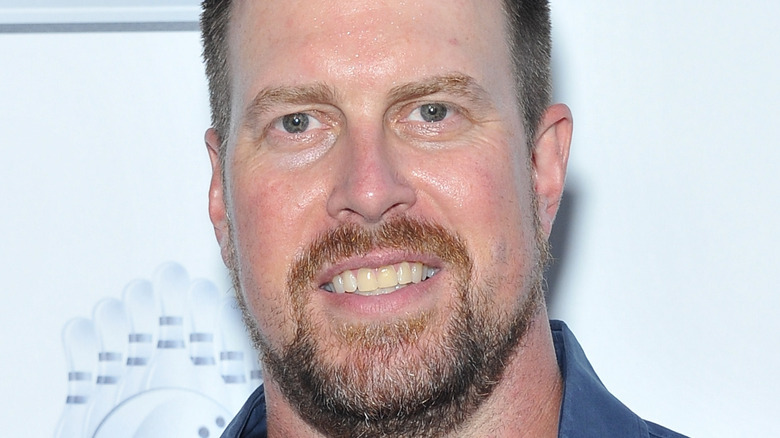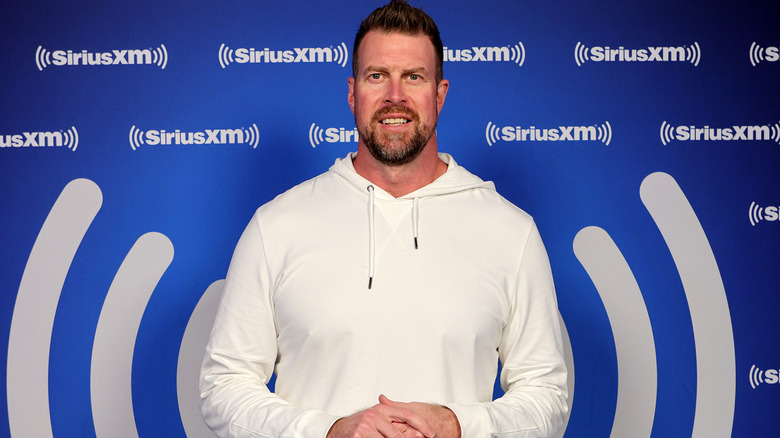What Ryan Leaf's Life In Prison Was Really Like
The world of professional sports can be hit or miss. Some athletes, such as Tom Brady and Michael Jordan excelled in their respective sports, parlayed their skills into lucrative endorsements and business deals, and then coasted on the efforts of their youth in their later years. Then, there are those athletes who nearly ruined their careers — like Tiger Woods — but were able to bounce back for one reason or another. The last category is the most tragic: athletes who burned out before they could reach their full potential.
Ryan Leaf's short history in the NFL falls into the latter category. Leaf's football career got off to a glowing start when he played for Washington State University. In 1998, Leaf was the No. 2 draft pick (via Yahoo! Sports), coming in just behind Peyton Manning, who went on to win two Super Bowl rings, per Fox News.
Unfortunately, Leaf's NFL career — which kicked off after being drafted by the Chargers and only lasted four years — was marked by disappointing performances, trades, and multiple injuries (via Bleacher Report). An early departure from the league was only the start of Leaf's downfall. Leaf also struggled with a prescription pill addiction that eventually led to time behind bars. In September 2014, a judge sentenced Leaf to five years in prison after he violated his parole, for a previous charge, when he attempted to steal painkillers from a home, per USA Today.
If you or anyone you know is struggling with addiction issues, help is available. Visit the Substance Abuse and Mental Health Services Administration website or contact SAMHSA's National Helpline at 1-800-662-HELP (4357).
Ryan Leaf was angry until a fellow inmate offered him some perspective
Ultimately, Ryan Leaf only served two years of his five-year prison sentence. And because the judge granted him time served — 27 months from his initial arrest (via ESPN) — he was released in December 2014, just three months after the official sentencing, per CBS Sports. However, Leaf didn't easily adjust.
According to the Associated Press, Leaf spent most of his prison bid feeling angry and isolated. However, an encounter with an inmate near the end of his stint changed his perspective. "He got on me one day about how I didn't understand the value that I had, not only to the men in there but for when I got out, and he confronted me on it," Leaf shared with the AP. The inmate then suggested they visit the prison library and mentor fellow prisoners who had trouble reading. And while Leaf noted that he usually pushed people away who'd tried to help him "be constructive," he hesitantly agreed. "It was the first time in my life that I was ever of service to anybody but myself," Leaf shared with ESPN. "At that moment, I didn't know it was this big, transformational kind of thing. I was just probably pissing and whining as I went down there," he continued.
Lending himself for the benefit of others, helped Leaf realize that, post-prison, he "needed to build a foundation that was built on service."
How is Ryan Leaf doing today?
Ryan Leaf's NFL days are long gone, but he's still doing big things. Today, Leaf, like many former athletes, has a relatively normal career — at least, compared to his previous profession. According to his website, Leaf still works in a football-adjacent field as a contributor to ESPN, ESPN2, and Sports Center. Additionally, he hosts a radio show on SiriusXM, where he talks about college football, according to USA Today. Leaf has also reclaimed his widely-accepted label as a "bust" by releasing "Bust: The Ryan Leaf Story," a podcast, where he gives candid recollections about his various struggles and triumphs in both football and his personal life.
Finally, Leaf has also continued to serve people in his own way. According to the Tampa Bay Times, Leaf works with the Transcend Recovery Community, a sober-living haven with bases in multiple states. "Ryan's celebrity and reach in the football world has allowed him to reach tons of people," CEO Christian De Oliveira told the publication. "You should hear the phone calls and read the emails, the social media response, and people asking for help because of what Ryan is doing. It's overwhelmingly positive."
If you or anyone you know is struggling with addiction issues, help is available. Visit the Substance Abuse and Mental Health Services Administration website or contact SAMHSA's National Helpline at 1-800-662-HELP (4357).



